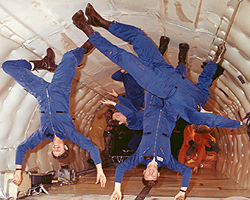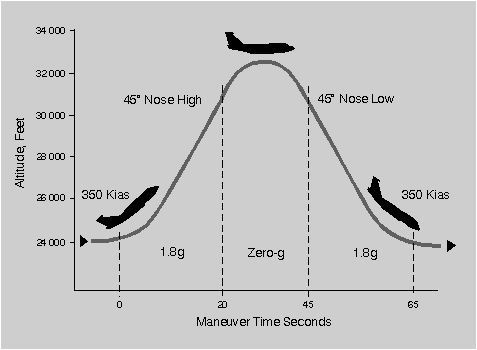The Vomit Comet
NASAWhile I eagerly looked forward to SMS, WETF, and MDF simulations, there was one simulator I could have done without....NASA’s zero-G plane, nicknamed “the Vomit Comet.” This was a modified Boeing 707 aircraft. Large sections of seats had been removed and the interior surfaces padded. After taking off from Ellington Field, the pilot would steer for the Gulf of Mexico, where he would fly the craft in a roller-coaster trajectory. While climbing toward the top of each “hill,” he would push forward on the controls so the trajectory of the plane exactly matched the pull of gravity. The result was a thirty-second free fall in which everything in the plane was weightless. Unrestrained astronauts in the back would float in their padded chamber. At the end of the dive, the pilot would perform a 2-G pullout that would smash everybody to the padded floor. He would then advance the throttles, climb back to 33,000 feet, and start all over. On a typical mission the process would be repeated about fifty times.
It took only one flight in the jet to understand why it was named the Vomit Comet. The plane was a barf factory. Just climbing aboard, the nose would detect a faint odor of bile. Like cigarette smoke that cannot be removed from the drapes of a two-pack-a-day addict, the smell of stomach fluid had permeated the very aluminum structure of the machine. Even when its aged bones are someday sold for scrap and melted down, the recycled aluminum will still bear the aroma of our stomach acid.
I quickly learned that the videos NASA released to the public of Vomit Comet-borne astronauts laughing and tumbling were recorded on the first couple dives because by the tenth weightless parabola someone would have already retreated into his or her seat and be vomiting copiously. Like the chain reaction of a nuclear explosion, the odor of fresh barf would drift through the cabin and send a few more over the edge. Those new smells would combine to affect yet more people. Even those who tried to block the smell by breathing through their mouths could not shield their senses, for the guttural sounds of the damned would fill the volume like a pack of barking German shepherds. By the twentieth parabola there were few smiles remaining. By the thirtieth parabola, some would be wishing the flight controls would freeze and the plane would smash into the sea at 600 knots and put them out of their misery. But through it all there would be the lucky minority, the immune who would smile and whoop and tumble and ask for more. I hated them.
Mike Mullane, Astronaut
Riding Rockets: The Outrageous Tales of a Space Shuttle Astronaut

NASA

NASA
